- Home
- Andrew McGahan
Underground Page 10
Underground Read online
Page 10
Pure chintz, really, but off in the administrative wings and away from the public eye, things were more businesslike, and Bernard, as a departmental head, had a whole suite. I was held in the waiting room for half an hour or so, flicking through glossy Local Government brochures. Then I was ushered through to Bernard’s office. And a glance told me that this wasn’t my little brother anymore. Instead he was . . .
Well, put it this way. Power pumps up men like balloons, and while he was still nearly fourteen years away from the full size and pomposity that he would display as Prime Minister, when I walked in I saw a man who was just beginning to inflate. It was something about the way the collar of his shirt cut into his neck—the new, defiant out-thrusting of his meagre chin. And when he shook my hand, a moue of distaste on his lips, it was perfectly clear that he thought I was exactly the sort of disreputable prick that might burst his bubble.
Ah, but why would I want to do that? The only point of this reunion, remember, was to help relaunch my career as a developer. I needed him fully inflated. And Bernard, for his part, knew that if he was stuck with a brother determined to trade on his name, then it was in his interest to at least set some ground rules. Which he proceeded to do. There would be no special treatment for me or my projects, he insisted—but on the other hand, his government was entirely in favour of development, and he wouldn’t do anything to stand in my way either, as long as I behaved with some decorum. And hey, I could read between the lines. If I kept my nose clean, he was telling me, he wouldn’t object to me leaning on the odd local council by dropping the name of the man who handed out the grants. And yes, he’d even introduce me and my friends to his friends in the party, as long as in return . . . Well, cash donations to the election fund were always warmly appreciated.
So we had an understanding, and I was back in the trade, and for the next five years I soared. Relatively, anyway. It wasn’t like the 1980s all over again, but still, it was good times. I had investors, I had developments on the go, I had my name in the paper. But it wasn’t only me. Looking back, it seems like the whole country had it pretty good too. The economy was up, unemployment was down. And yet the period seems a dull blur now. Strangely lifeless. There must have been important things happening, headlines on the news every night, but to tell the truth, I can recall very little. There was the big debate about Australia becoming a republic. A year of fuss and fury that ended in nothing. There was all that stuff about apologising to Aborigines for taking over their country. More fuss, more fury, and nothing whatsoever as a result. There was the rise and fall of One Nation. The biggest fuss and fury of the lot, and again, so much rotting newspaper now. Is that really all we had to worry about? The introduction of a sales tax, a few skirmishes with the unions, an ever-victorious cricket team, the Olympics in Sydney?
And the world? What were the big international concerns? The death of Princess Di? Monica sucking President Clinton’s dick? The Y2K bug? It’s bizarre—why can’t I remember anything important? There must have been wars and revolutions going on everywhere. There must have been warning signs. I suppose to anyone in the Middle East or the Third World, there were signs aplenty. But us westerners . . . lord, we were just sailing along. I do recall that al-Qaeda were active even then, bombing things here and there. But no one was really worried about them, were they? And sure, people talked about terrorism, and rogue states, and the evils of oppressive regimes. But it was only talk. I suppose everyone was still bathing in the afterglow of the collapse of communism, even a decade on. The big battle was won. There was nothing left to do but sit back and watch the money roll in. Easy to see the collective blindness now. A lot harder when you’re part of the generation living it.
And yet it’s curious. Australia had things rosy—but somehow, for Bernard and the Liberal Party, the times weren’t quite so good. They were in power, yes, but to many people they still seemed a rather ordinary government, and John Howard only an average Prime Minister. That’s hard to credit now, when Howard stands tall in the books as one of the longest-serving PMs in the nation’s history. But he was a bit of a joke back in the nineties, even to the people who voted for him. Who can forget him showing up at that rally on gun control, out west—conservative voters all, his very support base—wearing a bullet-proof vest in case someone shot him! Then there were problems with his ministers, sackings for incompetence, the messy union battles, the endless cost-cutting. Between it all, after a mere three years in government, he very nearly lost his second election. A few more years passed without much improvement, and as 2001 rolled around, yet another election was looming, and Labor was streets ahead in the polls.
As for Bernard, he stagnated in Local Government for most of that period. Very handy for me, but obviously frustrating for him. To most of his colleagues, he seemed increasingly strange. Even though it had nothing to do with his portfolio, most of his utterances seemed to be about things like national security and foreign affairs. And about the USA. He was greatly heartened by the return to sanity in the States, with the election of George W. Bush. From afar, he encouraged the Republicans to stamp their authority on the world. Forcefully, righteously, and even militarily, if necessary. Indeed, in retrospect, Bernard was talking like a neo-con even before the term was much in use, and preaching a hawkish line at a time when the likelihood of anyone starting a new war was next to zero. But the White House—in Bush’s first year, at least—didn’t seem to be listening. Like the Howard team, they were floundering about in search of direction. What both governments badly needed, Australian and American alike, was a defining purpose.
Hey presto—September 11.
And no. Let me make this clear. I don’t for a second think that there was any grand conspiracy about the attacks, that somehow the CIA or other Bush cronies were behind it. The idea is lunacy. You have to remember, it was a more innocent era. Western administrations didn’t slaughter thousands of their own citizens just for politics’ sake. (Nowadays, on the other hand . . . Okay, we’ll get to that all in good time.)
But my God, talk about synchronicity for the Bush camp. A crisis just when they needed it most, and a chance to shine forth with leadership.
Perfect timing for the Liberals, too, in Australia. Although, in fact, we already had our own little crisis going on here in the weeks before 9-11, which was doing wonders for the government—the wave of refugees that had begun to break across our unwilling shores, most of them Muslim. John Howard was joyfully whipping up hysteria about the invasion, and playing hard ball with the refugees themselves, locking them away or stranding them at sea. The voters were lapping it up, anti-Islamic feeling was on the rise, Labor was caught wrong-footed and, who knows, the refugee issue alone might have got the Liberals home. But then the planes crashed into the USA—all of them piloted by Muslims—and that was game, set, and match. Suddenly the Prime Minister was shoulder to shoulder with George W. Bush against the new Enemy, and only fools, pacifists and traitors would have dared to vote against him. That’s when John Howard the political giant was born.
It was the true beginning for Bernard, too. No doubt he was sobered and mortified and sickened by the Twin Towers, just as we all were. On the face of it. For public consumption. But inside, I bet he was grinning from ear to ear. The neo-con nonsense he’d been spouting for years was suddenly the new gospel truth, and in Australia, at least, he was one of the leading prophets. In the ensuing election, the Liberals won in a landslide, and in the new cabinet, Bernard was elevated to a whole other realm of power and influence. A security portfolio.
But me . . . The day after the attack, I was wandering the streets of Sydney, trying to go about my business despite a head full of terrible premonitions. And you know, the thing that stuck with me most wasn’t the planes crashing and the buildings falling. No—it was the expression I’d seen in the eyes of the American news presenters in the first hours of the disaster. As the towers were followed by the Pentagon, and then the crash in Pennsylvania, and then by wild reports that
other aircraft were circling up there somewhere, waiting to hit their targets—I saw something in the news readers’ eyes that was astonishing to see on American TV. Fear. Stark and bewildered, not knowing where to turn for the next horror.
I had never, ever seen that expression on the face of the USA before, and it was their fear that scared the absolute shit out of me. Not because I had any concerns for Australia or for myself right then. I wasn’t worried about planes falling out of our own skies. It was because I knew that, once America stopped being afraid, they were going to be angry. Angry about the attacks, of course, yes, but absolutely furious at being scared and humiliated like that. They were going to be outraged. And when the most powerful country the planet has ever seen is in a rage—a red-faced, spittle flying, screaming fury—then it didn’t matter who you happened to be in the rest of the world. Friend, enemy, neutral—all of us were going to be running for cover.
FIFTEEN
The mass meeting of the Australian Patriotic Society was taking place at the Brisbane Convention Centre—just across the river from the city heart. Something like twenty thousand people were expected, and the footpaths surrounding the centre had taken on a carnival atmosphere. It was early afternoon by the time we arrived, sunny and warm, and crowds were flocking everywhere amidst the booths and stalls and flutter of patriotic banners.
Security forces had closed the area to traffic, so our bus parked a block away, and we all climbed out to join the throng, waving our little Australian flags. Loudspeakers crackled noise. The smell of hot dogs wafted through the air. Children cried and laughed. It might really have been a carnival, except for the police and the soldiers who stood watching at every corner, guns at the ready. It was a peculiar feeling—the warm day, the crowd, the tall buildings of Brisbane all around—and several hundred armed men who, if only they’d known, would have shot me and Aisha on sight. Fortunately, they weren’t really looking for us. (That was the job of the various roadblocks we’d encountered, and safely passed, on the trip down.) The forces there at the rally were more worried about suicide bombers or protesters. So, tucked away in the middle of the group, Aisha and I walked unnoticed by anyone, safe behind our disguises.
In the shadow of the convention centre we came to the major checkpoint for entry. Long queues had formed there, in front of the metal detectors, under an enormous banner that read ‘A Loyal Australia. A Safe Australia. A Strong Australia’. Our own group of Patriots, babbling with pretend excitement, dutifully joined the lines—but Harry discreetly led Aisha and me away. We headed along a row of merchandise booths, then past the traffic barriers and off down towards Musgrave Park. The crowd thinned out, and we came to a taxi parked at the roadside, the driver lounging against the hood, smoking and reading a magazine. He and Harry exchanged a minimal nod, and we all climbed in, Aisha and me in the back seat. Then we swung away, heading south, and turned onto Vulture Street.
I studied the driver. He looked like an old hand behind the wheel—world-weary and unshaven, elbow out the window—and was ignoring us steadfastly. He had to be in the OU, however. Harry would never have loaded us into just any cab. Not when every taxi in the nation has been fitted with live cameras and microphones, all linked to a central AFP database with the latest in facial recognition software. True, the cab we were in was rigged with all the gear, lights blinking—but there was no chance that any of it was working properly.
No one said a word, and we moved along into Woolloongabba. Slowly. Indeed, the traffic seemed inordinately heavy for the hour, but it wasn’t until we came over the hill near the Mater Hospital that I could see why. Up ahead was the Brisbane Cricket Ground, and another big crowd of people was swarming about outside the stadium, the attendant security forces blocking half the street. I sat up, interested.
‘It’s a one-day game,’ Harry said, glancing back.
‘Between who?’
His face was deadpan. ‘Australia versus the USA.’
I sat back. Yes . . . I’d read something about this weeks before, in the papers. It was supposed to be a demonstration match, and the first official international fixture between the two countries. Although it wasn’t a real American team—it was a military one, made up of players from the various US bases around Australia. Still, I was stunned when our driver pulled over across from the stadium and handed Harry a bunch of tickets.
‘We’re going in there?’ I said, staring.
‘It’s all been organised,’ Harry replied. ‘Just follow me.’
Then we were out on the footpath, surrounded by cricket fans. We bypassed the long lines for general seating, and headed instead for one of the special entrances. Soldiers bearing guns stood watchfully along the walls. Some of them, I finally noticed, were US troops. Their eyes scanned the crowd steadily, myself included—but again, they were looking for the usual bombers or troublemakers, not fugitive individuals. We made the gate unopposed, ran our tickets through the machine, were sniffed by the explosive sniffers, then passed through the metal detectors and on into the bowels of the stands. From there it was up several flights of stairs and, finally, through a door that bore a placard reading ‘AC, Exclusive Guests’.
And there it was, the Gabba, spread out before us, green and beautiful in the sunshine, pleasantly dimmed by a wall of dark glass. We were in a corporate box. Quite a nice one, too, with comfortable chairs arranged before the window, a television at either end, and a small bar and fridge waiting at the back. On the other side of the glass, some thirty or forty thousand people were gathering in the stands.
‘This is the craziest thing I’ve ever heard of,’ I said.
‘Why?’ Harry seemed perversely cheerful. He was rummaging through the fridge. ‘I think it’s pretty clever, actually.’
‘Half the US bloody Army is outside.’
He found a beer, studied it with satisfaction. ‘Take a look at the stands. The other half is inside. To watch the game. What d’you expect? Their boys are playing.’
I glared through the window. He was right, I saw uniforms everywhere, Australian, American, air force, navy, marines, thousands of them.
‘Relax.’ A beer bottle hissed open. ‘You want one?’
I took the beer—hey, it was a while since I’d had a drink—but I wasn’t happy about it. Nor did Aisha seem to be. She was walking up and down before the glass, gazing out intensely at all of those sworn enemies in uniform.
‘What date is this?’ she wanted to know.
‘The twenty-sixth.’
And something about that seemed to disturb her.
‘Listen, both of you,’ Harry said, flopping down in a seat. ‘You’re safe here. No one can see in, and no one would think to search for you in this of all places.’
‘We’d be safer in one of your Underground houses,’ I complained.
He shook his head. ‘It’s only for a few hours. Then we’ll be linking up with our transport out of Brisbane. They’re already right here at the ground.’
‘And who is that?’
He only smiled. ‘Sit down. Watch the game.’
I sat down and stared out impatiently. Things weren’t underway yet, but both teams were on the ground, warming up—the Australians in their green and gold one-day gear, the Americans in a stars-and-stripes get-up that looked ridiculous. The whole event, in fact, felt ridiculous. A desperate attempt to create a spectacle. But that’s what international affairs have driven us to. With Pakistan no longer invited to play here, and with South Africa boycotting us for our supposedly inhumane treatment of detainees, and with even New Zealand frozen out, well, there are big holes to fill in the cricketing schedule.
Harry was watching Aisha as she prowled.
‘You don’t like cricket?’ he asked.
‘It’s a stupid game,’ she said, still preoccupied.
‘But Islamic countries play too. What about Pakistan? Bangladesh?’
She shook her head abruptly and walked to the fridge. She pulled out a bottle of white wine, unscrewed the
cap, and poured herself a glass.
Harry gave her a look of mock astonishment. ‘You drink?’
In answer, she downed half of it in one gulp.
‘Some Muslim you are,’ he laughed.
She perched moodily on a chair and said, ‘I’m a new kind of Muslim. A kind you’ve never met or even dreamt of.’
Harry frowned for a moment. ‘What kind is that?’
But Aisha had withdrawn again.
I drank. The beer was wonderful. But it, too, only raised more questions. Who was paying for it? Whose corporate box was this anyway?
I said to Harry, ‘What does AC stand for?’
‘AC?’
‘On the door.’
‘Oh. Australian Cricket.’
‘The Australian Cricket Board? This is their box?’
‘One of them.’
‘How on earth did you get it?’
He gave a shrug. ‘Through a friend.’
A friend on the board of Australian Cricket? I couldn’t have been more shocked if he’d said the OU had contacts amongst my brother’s cabinet ministers.
‘It’s no surprise, really,’ Harry continued. ‘Politically, the Cricket Board might be as conservative as they come, but the cricket is what really matters to them, and the way things are going with the game under this government . . . Well, certain members are deeply distressed. We can’t just keep playing England and India and the West Indies for the next ten years. And games like this are a travesty.’

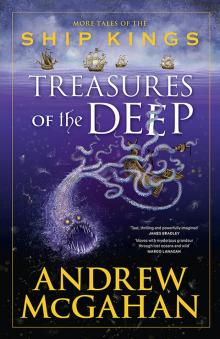 Treasures of the Deep
Treasures of the Deep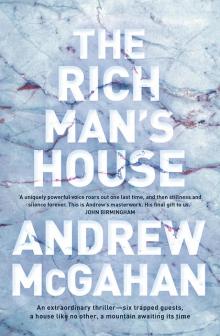 The Rich Man’s House
The Rich Man’s House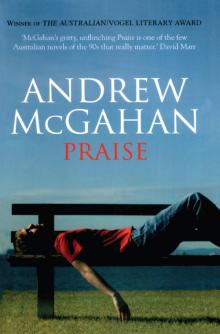 Praise
Praise The White Earth
The White Earth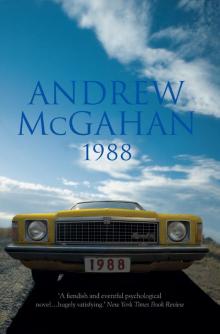 1988
1988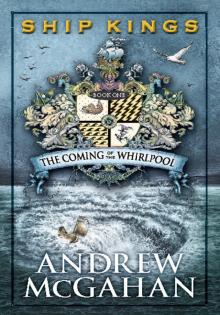 The Coming of the Whirlpool
The Coming of the Whirlpool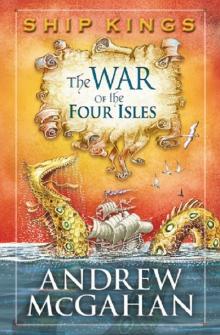 The War of the Four Isles
The War of the Four Isles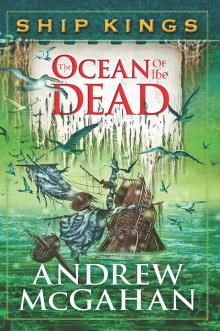 The Ocean of the Dead: Ship Kings 4
The Ocean of the Dead: Ship Kings 4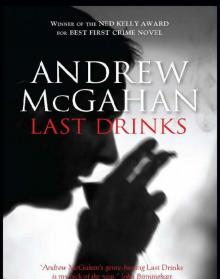 Last Drinks
Last Drinks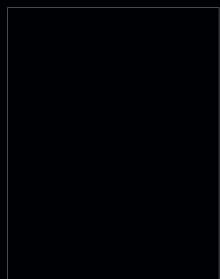 Wonders of a Godless World
Wonders of a Godless World Underground
Underground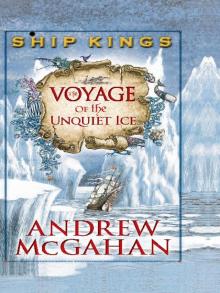 The Voyage of the Unquiet Ice
The Voyage of the Unquiet Ice